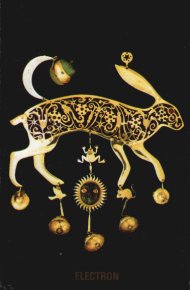 W
WThe Eternity II puzzle is an edge-matching puzzle launched on 28 July 2007. It was developed by Christopher Monckton and marketed and copyrighted by TOMY UK Ltd as a successor to the original Eternity puzzle. The puzzle was part of a competition in which a $2 million prize was offered for the first complete solution. The competition ended at noon on 31 December 2010, with no solution being found.
 W
WThe Eternity puzzle is a tiling puzzle created by Christopher Monckton and launched by the Ertl Company in June 1999. It was marketed as being practically unsolvable, with a £1 million prize on offer for whoever could solve it within four years. The prize was paid out in October 2000 for a winning solution arrived at by two mathematicians from Cambridge. A follow-up prize puzzle called Eternity II was launched in 2007.
 W
WHareraiser is a video game released in 1984 in the UK in two parts: Prelude and Finale. The game was published for Acorn Electron, Amstrad CPC, BBC Micro Model B, Commodore 64, Commodore VIC-20, Dragon 32, MSX, Oric Atmos, and ZX Spectrum at £8.95 for each part.
 W
WNob Yoshigahara Puzzle Design Competition – is an annual award and competition in the engineering and design of mechanical puzzles. The location of the competition rotates between North America, Europe, and Japan. It was founded in 2001, and has been known since 2005 as the Nob Yoshigahara Puzzle Design Competition, after the renowned puzzler Nob Yoshigahara.
 W
WThe Secret is a treasure hunt created by Byron Preiss. The hunt involves a search for twelve treasure boxes, the clues to which were provided in a book written by Preiss in 1982, also called The Secret. These boxes were buried at secret locations in cities across the United States and Canada that symbolically represent events and peoples that played significant roles in North American history. Anyone who uncovered one of the treasure boxes was entitled to exchange it with Preiss for a precious gem; after Preiss died in 2005, his estate assumed the responsibility of honoring the terms of the treasure hunt. As of October 2019, only three of the twelve boxes have been found. Preiss kept no record of the treasure boxes' exact locations before his death, leaving it a possibility that the remaining boxes may never be recovered.
 W
WSwordquest is an unfinished series of video games produced by Atari, Inc. in the 1980s as part of a contest, consisting of three finished games, Earthworld, Fireworld, and Waterworld, and a planned fourth game, Airworld. Each of the games came with a comic book that explained the plot, as well as containing part of the solution to a major puzzle that had to be solved to win the contest, with a series of prizes on offer whose total value was $150,000. The series had its genesis as a possible sequel to Atari's groundbreaking 1979 title Adventure, but it developed mythology and system of play that was unique.
 W
WThe VT Hunt, notated with the symbol ᚖᚌᚖ, is an annual puzzlehunt at Virginia Polytechnic Institute and State University. This competition typically has hundreds to thousands of participants, with the 2019 Hunt attracting roughly 1800 participants on 550 teams. The team completion rate for the 2019 challenge was 12.3%, according to the official statistics page. That year, the VT Hunt team raised $6,500 for Relay for Life, and an additional $500 in individual donations on its behalf.
 W
WThe World Sudoku Championship (WSC) is an annual international puzzle competition organised by a member of the World Puzzle Federation. The first event was held in Lucca in 2006. National teams are determined by local affiliates of the World Puzzle Federation. The competition typically consists of 100 or more puzzles solved by all competitors over multiple timed rounds, including classic sudoku, variations and other puzzle types, normally followed by a playoff for the top qualifiers to determine a champion. Examples of rounds include the Relay round, where an answer from one puzzle contributes digits to the start of the next sudoku, and the "World Record" round, in which solvers competed to set a Guinness World Record for fastest sudoku solution.